
By Charlie Wailes | Reporter
The Bears Medical Student Association (BMSA) will travel to the Rio Grande Valley this winter to shadow and support medical clinics.
Katy junior Jackie Farolan is one of the student leaders for the trip. She said she was motivated to help after seeing health care discrepancies in the area.
“My family is actually from the Rio Grande Valley — both sides of my grandparents, aunts and uncles and cousins — so I pretty much grew up there,” Farolan said. “Going back and forth to visit them and seeing all the health care discrepancies motivated me to apply for the global health care co-chair position and be able to lead these mission trips, so I give back to my community.”
Every winter break, Farolan and other student leaders plan the Rio Grande Valley mission trip, as well as an upcoming spring break mission trip to the Dominican Republic. Applications for the Rio Grand Valley mission trip are due Dec. 1.
While Farolan said the mission trips provide memorable and heartwarming moments, she said her favorite part is hosting medicine and clothing drives to give back to the community. She also said something that stood out to her was volunteering at the respite center, which houses refugees from Mexico and Central America.
“It’s really humbling to see the conditions that they live in day to day and every night where they sleep,” Farolan said. “It just changes your perspective a lot on giving back to those underserved populations, helping them out more in any way that we can.”
The mission trip is free, which Farolan said is purposeful in order to allow more students the opportunity to volunteer.
“The only fee people would have to pay is gas money and things for groceries and things like that, and we stay at the church there,” Farolan said. “BU Missions just wants to provide that opportunity for a lot of students to be able to apply and come with us on this trip.”
On the mission trip, Farolan said students will be doing all sorts of work to support people in need.
“At the respite center, there’s a clothing room, which is why we hosted the clothing drive,” Farolan said. “It’s to give the refugees new clothes — anything they need, like a T-shirt, pants, hoodie, jacket, new shoes — because they’re very much in need of all those things.”
Farolan said another benefit of the mission trip is getting to speak Spanish in a clinical setting, which is beneficial for aspiring health care students.
Participants will go to Harlingen to volunteer at the Culture of Life Clinic; Farolan said Baylor Missions has had a connection to it for the past three years.
“There are nurse practitioners that we are able to shadow,” Farolan said. “Sometimes we even get to take patients’ vitals and interact with them. If we’re skilled enough, they’ll let us draw blood from them or things like that. But it’s cool being able to see them in action.”
Dr. Fernandez Luna is one of the faculty leaders for the trip, along with her husband, Dr. Ramon Lavado. She said this semester is her first with BMSA, after one of her students had asked her to join the program.
Luna said she believes she has a good understanding of the goals of BMSA, even though this will be her first mission trip.
“From my perspective, getting to know the needs of immigrants and helping in any way is the most important thing,” Luna said.
Luna said she has certain expectations going into the trip. She said she plans to bring her daughter, who, unlike Luna and her husband, was born in the United States. She also said the trip is a crucial experience for Baylor students who want to know these conditions and are headed to medical school.
“The experience for my daughter and my family, to know of the real conditions from immigrants coming from Mexico and Central America, is very important,” Luna said. “To see the problems that can be found in many parts of the world and to know the poverty of other communities, is something I hope the students understand.”





